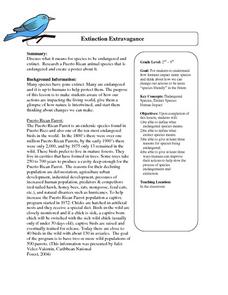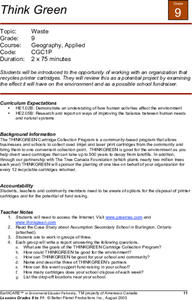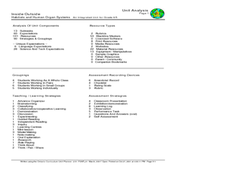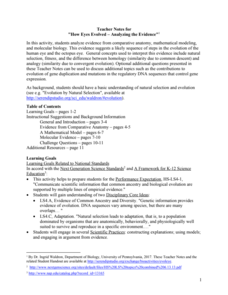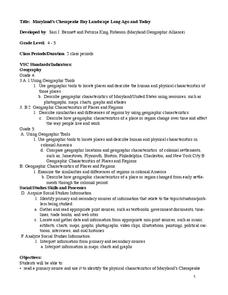Curated OER
Feeling Vulnerable
Students discover some of the ways the developing world is vulnerable to the impact and effects of natural disasters. They investigate some "natural disaster hotspots" around the globe and assess how vulnerable these areas are.
Curated OER
Extinction Extravagance
Students brainstorm and discuss what it means for a species to be considered endangered and/or extinct. They research animals in Puerto Rico and choose one that is considered endangered and create a poster about it. In addition, they...
Curated OER
Dissidents Delicately Democratize
Students read and discuss the article, 'Chinese Dissidents Issue a Sharp Challenge to the Government' on pro-democratic manifestos that were recently written in China, write a journal entry on what human rights means to them.
Curated OER
The Energy Grab Game
Eighth graders explore the scarcity of energy resources. They also explore the competition for natural resources and the inadequate distribution of natural wealth among the Earth's nations.
Alabama Learning Exchange
Systems Every "Body" Needs to Know
Through an informative WebQuest and group work, learners explore the human body and cell structure. They create a cell diagram, research a disease, write a letter explaining the causes of human disease, and work in small groups to create...
Curated OER
Evolution of a Virus
In this viruses and evolution worksheet, students read an article on line about the avian flu virus and its evolutionary changes. They answer ten questions about the article including topics such as natural selection, mutations and...
Curated OER
Managing Wildlife
Students explore the relationship between wildlife and humans in northern New England. They also brainstorm ideas on why they think some species are greater in population than others in a given area.
Curated OER
Floodplain Modeling
Students simulate the impact of fluctuating river volumes on structures and landforms. They experiment with table top-sized riverbed models and water. Students consider how human design can help mitigate the effects of a flood.
Curated OER
Writing the Wind
Students make a windmill. In this wind lesson, students learn background information about the windmill, complete an activity where they create a windmill, discuss using wind as a natural resource and brainstorm other inventions that...
Curated OER
Lesson: Living With the Farm Next Door
Discuss with learners why farms are growing in size and why there is sometimes conflict between farmers and their non-farming neighbors. Read the article, "Living With the Farm Next Door," and then craft letters to the editor from the...
Curated OER
Think Green
THINKGREEN has a computer printer cartridge collection program. After reading the story of how Assumption Secondary School in Burlington, Ontario started participating in the THINKGREEN recycling program, pupils work in groups of three...
Curated OER
Inside Outside: Habitats and Human Organ Systems
Students examine the way habitats and human organ systems function. In groups, they role play the role of a government group assigned to determine if a settlement can make their home in a specific area. They must discover how humans and...
Curated OER
Documents of Natural Rights: The Declaration of Independence and The Plan of Delano
Eighth graders analyze the philosophy of government in the Declaration of Independence. As a class, they discuss how this philosophy has caused other revolutions in history and how well it supports our natural rights. In groups, they...
Chicago Botanic Garden
Introducing Ecosystem Services
Purifying air and water, providing soil in which to grow crops, and moving water through its natural cycle are all services an ecosystem provides that benefit humans. Lesson four in a series lets learners explore and discuss the value of...
Serendip
How Eyes Evolved – Analyzing the Evidence
Octopodes existed for hundreds of thousands of years before humans, yet our eyes share many similarities. Scholars analyze the evidence to determine if the evolution of eyes best fits a homology or analogy model. They discuss the issue...
Channel Islands Film
Once Upon a Time (Saxipak’a): Lesson Plan 4
How did the environment and natural resources found on the Channel islands influence the culture of the Chumash? Archaeology meets technology in an activity designed for middle schoolers. After viewing West of The West's documentary Once...
American Museum of Natural History
What Do You Know About Genetics?
Just what do you know about genetics? The online resource contains 10 questions about genetics. Scholars work through the questions ranging from what DNA stands for to how much of human DNA is similar to that of a fruit fly. Scholars...
Science Matters
That’s An Otter Story
Young scientists discover how sea otters' habitats have changed due to human impact. Through conversation, video observation, and story reading, scholars identify how human interactions change a specific ecosystem in both positive and...
Kenan Fellows
The Little Stuff Can Make a Big Difference
Great things come in small packages! What better way to illustrate this point than a week-long look at nanotechnology? Earth science scholars explore water quality issues through lab activities, then research new innovations in nanotech...
Curated OER
When Is It O.K. to Replace Human Limbs With Technology?
Today's blog topic is robotic limb replacement for amputees. Upper graders read the related article and argument, then compose a blog response that addresses the questions provided. This is a great way to get kids thinking about ethics,...
Curated OER
Maryland’s Chesapeake Bay Landscape Long Ago and Today
Combine a fantastic review of primary source analysis with a study of Captain John Smith's influence on the Chesapeake Bay region in the seventeenth century. Your young historians will use images, a primary source excerpt, and maps...
Curated OER
An Exploration of Cradle-to-Cradle Design Thinking
Introduce cradle-to-cradle design thinking. Scholars first discuss the importance of natural laws and rights. They then use a variety of online and print resources to research eco-efficiency and cradle-to-cradle design.
Florida Department of Environmental Protection
Water's Journey Expedition
Step into a scientist's shoes to go online and discover the Florida Springs Expedition, and participate in two activities focusing on how humans impact the environment. The first activity asks scholars to summarize the six dispatches at...
NOAA
What Killed the Seeds?
Can a coral cure cancer? Take seventh and eighth grade science sleuths to the underwater drugstore for an investigation into emerging pharmaceutical research. The fifth installment in a series of six has classmates research the wealth of...
Other popular searches
- Philosophy of Human Nature
- Democracy and Human Nature
- Essays on Human Nature
- Human Nature Hobbes
- Human Nature Good
- Enlightenment Human Nature
- Human Nature in Plays
- Human Nature Environmental
- Poetry on Human Nature
- Aristotle Human Nature
- Human Nature Enviromental



